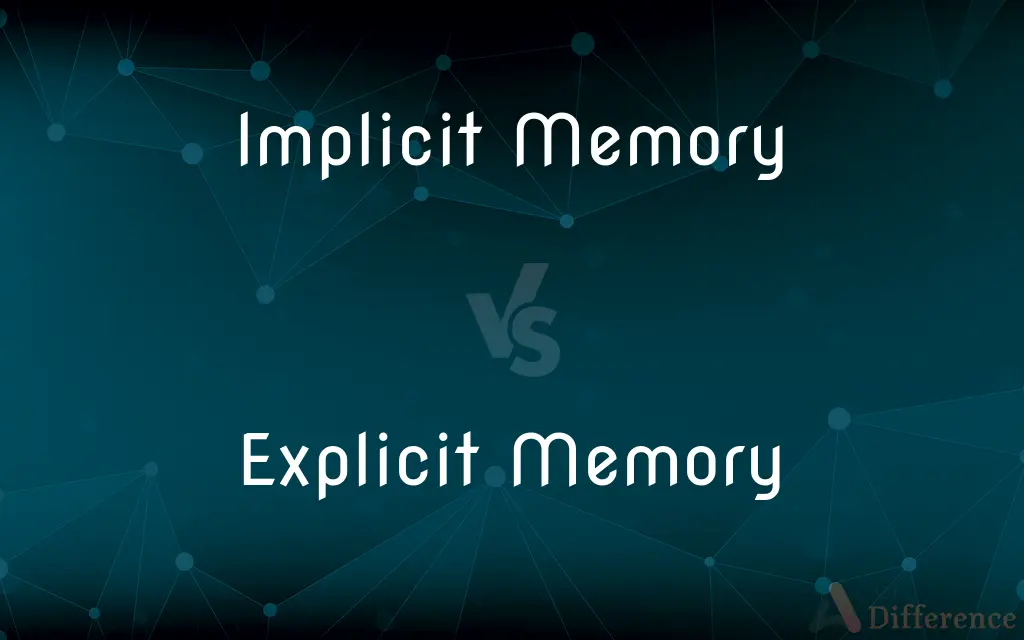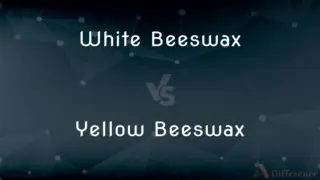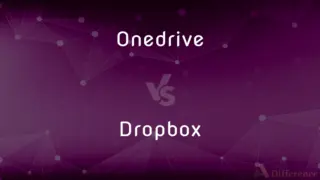Implicit Memory vs. Explicit Memory — What's the Difference?
By Maham Liaqat & Fiza Rafique — Published on October 1, 2024
Implicit memory operates unconsciously, guiding skills and tasks like riding a bike, whereas explicit memory involves conscious recall of facts and events, such as remembering a birthday.

Difference Between Implicit Memory and Explicit Memory
Table of Contents
ADVERTISEMENT
Key Differences
Implicit memory is a type of long-term memory that facilitates the performance of tasks without conscious awareness of these previous experiences. It's crucial for skills and habits, like driving or typing, where actions become automatic with practice. On the other hand, explicit memory involves conscious recall of information and experiences, such as recalling a friend's name or a historical fact. This type of memory is divided into episodic (personal experiences) and semantic (general knowledge) memories.
Implicit memory allows individuals to perform complex tasks without actively thinking about the steps involved, making daily routines more efficient. For example, one can navigate familiar routes while mentally occupied with other thoughts. Whereas, explicit memory requires direct attention and recall, playing a key role in academic learning and personal reflection. It enables detailed recollection of specific events and information.
The formation and retrieval of implicit memory occur without deliberate effort, often through repetition and practice. This aspect is evident in procedural learning, such as playing a musical instrument. In contrast, explicit memory formation typically involves more deliberate effort and encoding strategies, such as rehearsal or mnemonic devices, to facilitate the recall of facts or events.
Implicit memory's resilience to forgetting is notable; skills once learned, such as riding a bike, are rarely forgotten, even without regular practice. Meanwhile, explicit memories can be more susceptible to forgetting, requiring active rehearsal or encounter with cues to be easily retrieved.
Understanding the distinction between implicit and explicit memory is essential in various fields, such as education, therapy, and neuropsychology. Educators leverage explicit memory strategies to enhance learning, while therapists may work on implicit memory processes to modify behaviors or habits. On the other hand, explicit memory's role in conscious recollection makes it a focal point in studies of memory disorders and aging.
ADVERTISEMENT
Comparison Chart
Type of Recall
Unconscious, automatic
Conscious, deliberate
Examples
Riding a bike, using a fork
Remembering a birthday, knowing the capital of France
Subtypes
Procedural memory, priming
Episodic memory, semantic memory
Learning Process
Through repetition and practice
Through active encoding and rehearsal
Susceptibility to Forgetting
Less susceptible, skills are retained long-term
More susceptible, requires rehearsal or cues for retrieval
Role in Daily Life
Facilitates routine tasks and skills
Enables conscious recollection of experiences and facts
Applications
Important in skill learning and habit formation
Crucial for academic learning and personal history
Compare with Definitions
Implicit Memory
Not easily verbalized or explained.
Riding a bike without being able to teach how.
Explicit Memory
Divided into episodic (personal events) and semantic (general knowledge).
Recalling a childhood birthday party (episodic) or the definition of a word (semantic).
Implicit Memory
Memory that enables task performance without conscious thought.
Knowing how to swim without thinking about each stroke.
Explicit Memory
Requires active learning and rehearsal.
Studying for a test by repeating information.
Implicit Memory
Operates automatically to support habits and skills.
Typing on a keyboard without looking at the keys.
Explicit Memory
Memory of specific information and events that requires conscious effort to recall.
Remembering your first day of school.
Implicit Memory
Crucial for daily routines and procedural tasks.
Driving the same route home every day without conscious navigation.
Explicit Memory
Can be verbally communicated and shared.
Describing a recent vacation in detail.
Implicit Memory
Developed through repeated practice and exposure.
Speaking a native language fluently without effort.
Explicit Memory
Includes facts and personal experiences.
Knowing the year World War II ended.
Common Curiosities
What is implicit memory?
Implicit memory is the unconscious recall of skills and habits, enabling the performance of tasks without conscious thought.
What is explicit memory?
Explicit memory involves the conscious recall of specific information and events.
Why is implicit memory less susceptible to forgetting?
Implicit memory is ingrained through practice and becomes an automatic response, making it more resilient to forgetting.
Can explicit memory become implicit?
Yes, with enough practice and repetition, some tasks initially requiring explicit memory can become automatic, relying on implicit memory (e.g., driving).
How are implicit and explicit memories formed?
Implicit memories are formed through repetition and practice, while explicit memories require active encoding and rehearsal.
How do implicit and explicit memory differ in daily life?
Implicit memory automates routine tasks and skills, while explicit memory is used for deliberate recall of facts and personal experiences.
Can you improve your explicit memory?
Yes, explicit memory can be improved through techniques such as rehearsal, mnemonic devices, and making connections between new information and existing knowledge.
Are there disorders that affect explicit but not implicit memory?
Yes, certain conditions, like Alzheimer's disease, can affect explicit memory more severely than implicit memory.
What role does implicit memory play in learning?
Implicit memory is crucial for learning and perfecting skills and habits, allowing for efficient and automatic performance of tasks.
Is all memory either implicit or explicit?
Most memories can be categorized as either implicit or explicit, but there are complex interactions and some overlaps between the two types.
How can you test for implicit vs. explicit memory?
Tests for implicit memory often involve assessing performance on tasks that don't require conscious recall, while explicit memory tests involve directly recalling or recognizing information.
Can therapy target implicit memory?
Yes, therapies like habit reversal training target implicit memory to change unwanted behaviors or habits.
Why is explicit memory important for personal identity?
Explicit memory, especially episodic memory, is key to personal identity, as it includes the recollection of personal experiences and events that shape who we are.
How do educators use knowledge of explicit memory?
Educators use strategies that enhance explicit memory, such as structured rehearsal and connecting new information to existing knowledge, to improve learning outcomes.
Do implicit and explicit memories use different brain structures?
Yes, different brain structures are involved; the hippocampus is crucial for explicit memory, while areas like the basal ganglia support implicit memory.
Share Your Discovery

Previous Comparison
White Beeswax vs. Yellow Beeswax
Next Comparison
Onedrive vs. DropboxAuthor Spotlight
Written by
Maham LiaqatCo-written by
Fiza RafiqueFiza Rafique is a skilled content writer at AskDifference.com, where she meticulously refines and enhances written pieces. Drawing from her vast editorial expertise, Fiza ensures clarity, accuracy, and precision in every article. Passionate about language, she continually seeks to elevate the quality of content for readers worldwide.













































